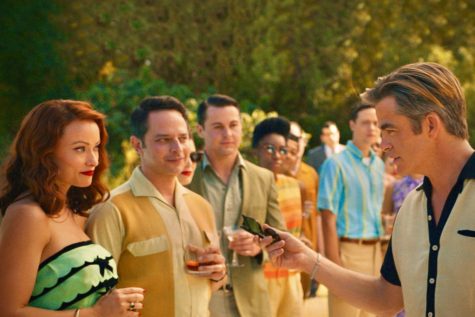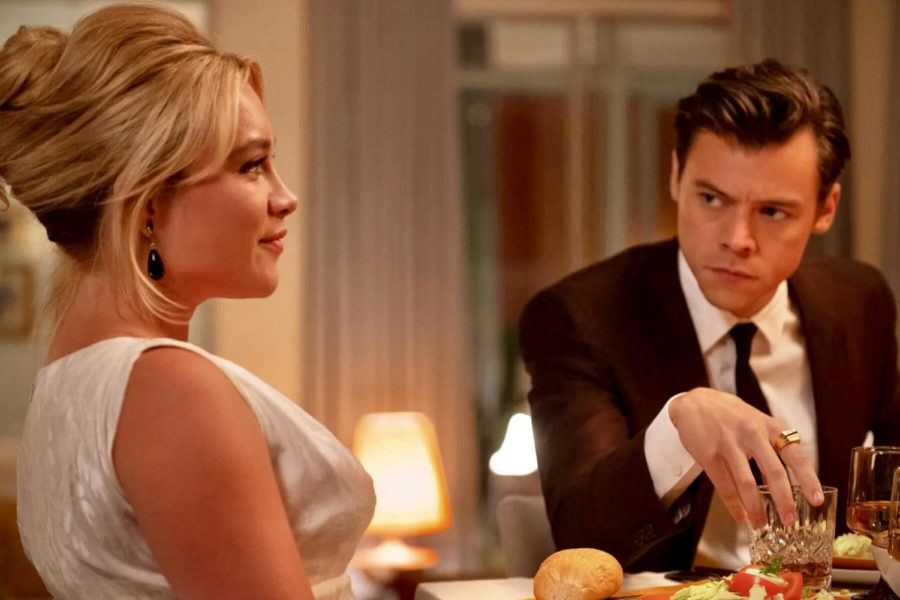It’s become no surprise that the production behind the new Warner Media financed “Don’t Worry Darling” was undoubtedly rough and comical to a certain extent. To many, the only thing the film itself had to conquer was the sheer magnitude of the borderline silly controversy surrounding it – and rest assured, it wasn’t worth any of it.
Set in a seemingly gleeful Palm Springs circa 1950 inspired suburbia, the fictional town of “Victory”, we follow an all too familiar housewife character named Alice (Florence Pugh), her dreamy husband Jack (Harry Styles), and their secretive, congregational friends down the neighborhood street. In the isolated comfort of Victory, the respective sexes pursue their jobs – with the ladies staying home and the men going off to some boarded-off jurisdiction, where no one knows what it is they’re actually doing.
Over the course of the film, Alice slowly starts to discover her ‘wonderland’ might be sinking into a vat of sinister tar right beneath her and her fellow women’s noses. It’s up to her to solve the mystery and she’ll gut the ego of anyone who stands in her way, including her devoted lover. Basically, it’s “The Stepford Wives” meets “Get Out” via “The Matrix”. So what’s stopping it from being great? Well…

The most problematic aspect of Don’t Worry Darling’s execution is its insistence that it is on a level of intellectualism and maturity that it simply isn’t. What’s unfortunate about the film’s otherwise intriguing atmosphere and message is the fact that it’s been done to death a million times. As someone who gravitates towards uncanny, surrealist movies, I was expecting something new. No less coming from the creative genius behind 2019’s “Booksmart”, a modern take on the teen-comedy genre that I quite love.
An important aspect that drags this film’s stature to plain blandness is how it prioritizes its mystery more than its twist. The film thinks it’s more cryptic than it actually is and as a result the ‘twist’ is easy to see coming from a mile away. Once audiences catch on some 10-20 minutes in, it depletes all of its entertainment value because you already know what it’s leading up to. It’s sad to see a film take pride in its intentional ambiguity when A, it’s not that ‘out there’ to begin with, and B, it matches none of the director’s conceptual ambition. It’s clear what Wilde is trying to accomplish but all the thought she put into it went out the window after taking the first draft of a script and running with it.
There are some aspects of this film that piqued my interest however. For one, I like its setting. The mid-century architecture and subtly-eerie atmosphere of the film was resonant with me for the first couple minutes. I also like seeing a quasi-period piece thriller getting a wide theatrical release. And as comically distributed as it was, the film’s agenda was a worthwhile one, it could’ve just been conveyed much better and less blatantly and it has before. An immediate comparison that sparked in my mind was David Lynch’s “Inland Empire”, a film that might be too much for the more traditional viewers among you but one that exemplifies what this film is attempting much better with infinitely more interesting results. There’s also “The Matrix”.
Additionally, a lot of people want to know if Harry Styles’ acting chops have the potential to compete alongside A-listers like Chris Pine and the aforementioned Pugh. And guess what? He doesn’t. Styles delivers one of the most borderline embarrassing performances of any musician of his caliber stepping into film. It becomes evidently clear from the moment he speaks that this isn’t a project for him to tackle. He is beyond tactile and forced, he doesn’t even feel present. Not only can he not match eyeline with the rest of the cast, although that might be on the director, he’s going for something so simple and moldable and yet he finds a way to add yet more mediocrity to an already unbearably mid film.
The drama surrounding this project is almost inline with the themes of the film itself, and the response has been understandably mixed with both critics and audiences – which is always enticing for me. If a film can have one 10/10 review from one critic’s perspective and a 1/10 from another’s, I’ll most likely check it out. But this is a film that prides itself in its response, which isn’t a compliment. The relentlessly telling promotions for this film spoiled some of the coolest sequences, which would be a fault of mine if I seeked those promos out but I don’t watch trailers for films I know I’m going to see. Through powers out of my control, Warner Bros. shoved this film down my throat through digital advertisements, and my expectations were reasonably tainted. When I go into something with not a lot of optimism, the film’s quality can be all the more surprising, however, this film didn’t exceed nor meet my little expectations. I found it boring, self-important, childish, and laughably anti-dramatic.
To put it as lightly as possible, “Don’t Worry Darling” is a film with an unoriginal narrative, some occasional talent, subpar delivery, and a leading man who if you ask me isn’t fit for the entertainment industry at all besides his looks. This film desperately wants to put its own relevance on a pedestal, which is ironic considering those who watch will probably forget about it immediately. To quote Olivia Wilde herself on The Late Show with Stephen Colbert, “If the film is bad, it’s the director’s fault”. Right you are Olivia, right you are.
4/10



